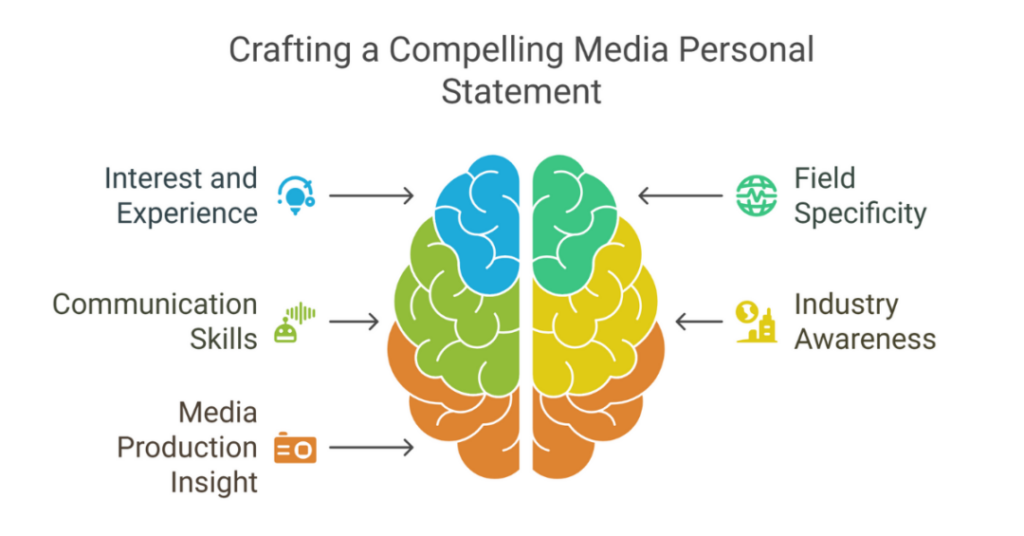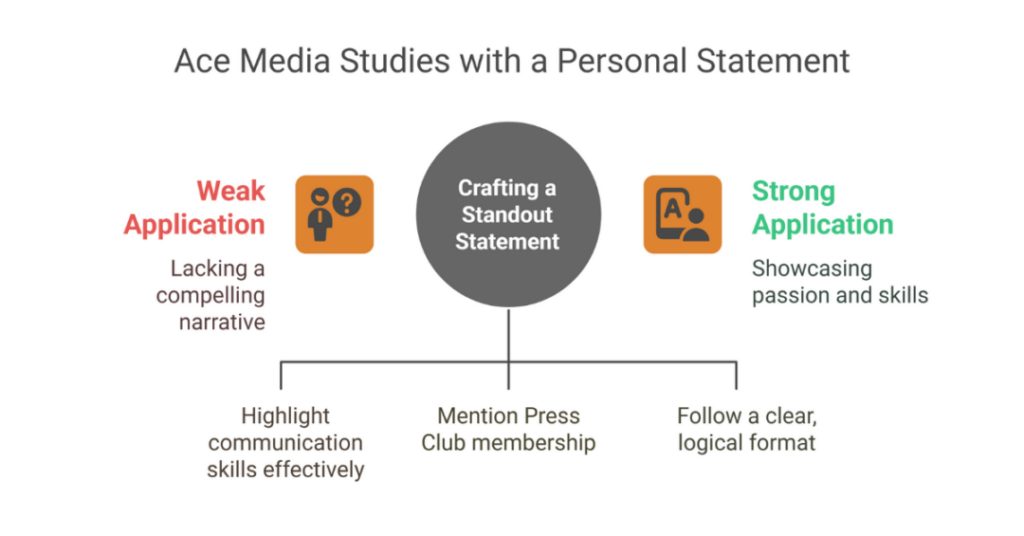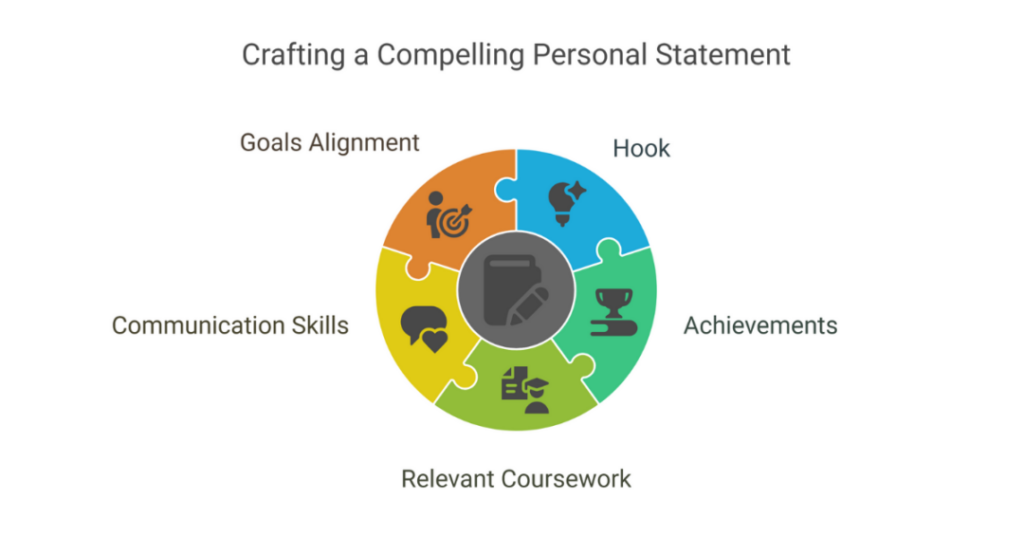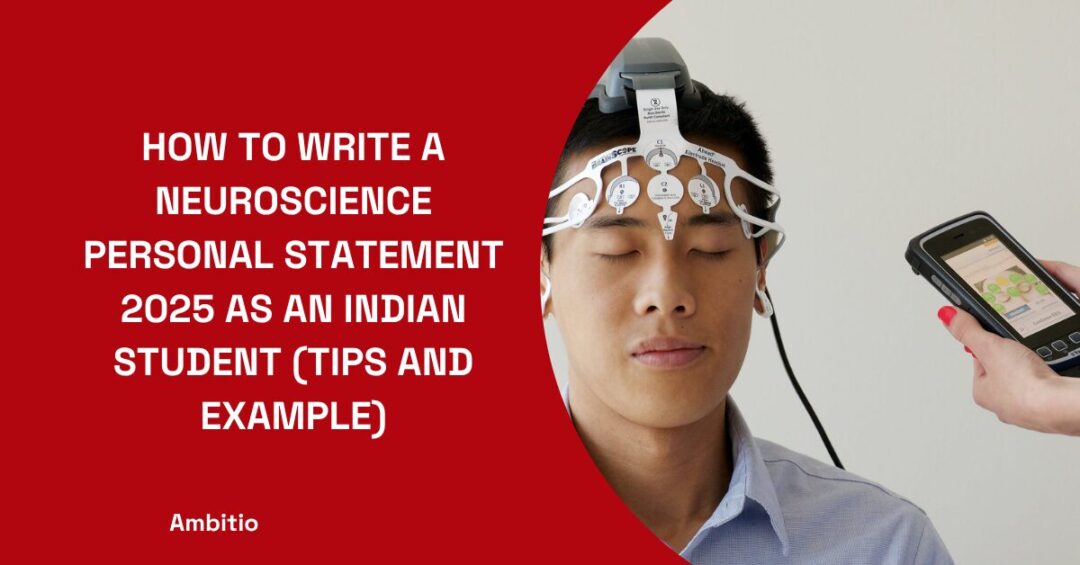6 June 2025
7 minutes read
How to Write a Personal Statement Media and Public Relations as an Indian Student?

Key Takeaways
- Personal statement media and public relations must reflect genuine interest, career goals, and communication skills tailored to the media industry.
- Personal statement media and public relations should include real experiences like publications, press club roles, and digital media exposure.
- Personal statement media and public relations helps Indian students stand out by showcasing storytelling ability, academic drive, and originality.
Writing a compelling personal statement for media and public relations can lead to opportunities at top international universities, particularly for Indian students seeking to establish a career in the colorful realm of journalism and mass communication.
As universities in the UK and around the world look for more than just grades, a personal statement serves as a lens into a student’s passion, communication, and their potential to thrive in the media landscape.
Whether a student aspires to study media, PR, or digital media, this statement becomes their personal pitch.
The transition from reading international relations journals and blogs to being a member of the Press Club of India or even writing a feature on demonetization for Business Standard, brings richness and weight to a personal statement.
This guide takes students through the basics of crafting an engaging media personal statement, providing structure, advice, and an example to inspire their own individual story.
What is a Media and Public Relations Personal Statement?
Did you know the world media industry is worth more than $2 trillion? A personal statement in media and PR is a student chance to introduce their personality, motivation, and qualifications for the degree of journalism or media communications.

Here’s what it should cover:
- A clear media and PR interest supported with experience or achievements.
- Specific mention of the media, media studies, or digital media field.
- Exhibited communication ability and interest to become a journalist or PR practitioner.
- Knowledge of the media sector covering global media and business communication.
- Understanding of media production personal statement aspects such as storytelling, interviewing skills and writing abilities.
How to Write a Public Relations, Media and Communication Personal Statement?
Fun fact: Over 80% of employers in PR and media prioritize good communication over technical skills. Writing a media personal statement involves expressing genuine interest and tailoring it to the programme applied to.
Important components to cover:
- Start with a hook: a unique experience, a moment, or an inspiration.
- Showcase achievements: part-time job, member of the press club, or being published.
- Mention relevant coursework: communication studies, media communications, or film studies.
- Highlight skills of communication such as clarity, empathy, and storytelling.
- Connect goals with the course: why this university or college and how it aligns with your career path.
Personal Statement Example Media and Public Relations
Fun fact: The role of radio is far from over—in fact, the growth of digital radio has expanded its reach globally. Let’s look at a personal statement example that ties passion with purpose.

Rahul Mehta, an Indian student with a love to write, aims to study PR and media communications at the University of Leeds, University of Sheffield, King’s College London, University of Westminster, Cardiff University, University of Stirling, University of Sussex, University of Glasgow, City University London, and University of Manchester.
“I believe stories hold power. As a teenager flipping through Business Standard each morning, I wasn’t just reading headlines; I was imagining how I could shape narratives that mattered. That curiosity led me to write a feature on demonetization which, to my surprise, got published. The editor was impressed. That moment convinced me that my voice, paired with good communication, could genuinely inform and impact the public.
At school, I joined the Press Club of India where I interviewed local officials, organized media literacy drives, and covered community events. These experiences sharpened my interviewing techniques and writing skills, teaching me not just how to gather facts, but how to convey them with precision and emotion. I have also developed management skills through my role as the club secretary, balancing schoolwork and press deadlines with effective time management.
Reading blogs and journals on international relations and business has broadened my worldview, giving me insights into the intricate link between media, politics, and public opinion. I am fascinated by the role of media in maintaining harmony between the government and its people, especially when navigating complex issues like climate policy or financial reform.
What excites me about pursuing a degree in journalism and mass communication is the opportunity to study media, PR, and digital media comprehensively. My ambition is to work in global media houses, using my communication studies to craft stories that transcend borders and reflect diverse voices. I am particularly drawn to the evolution of digital radio and its impact on storytelling. The growth of digital radio has shown how traditional formats can find new life in the digital age, offering both depth and immediacy.
I have also taken part-time jobs in social media management, helping small local businesses build their online presence. These experiences introduced me to the nuances of digital communication, branding, and business news and international relations. I discovered how good communication could shape public perception, drive engagement, and establish trust—all key aspects of PR.
Beyond academics, I love to write, and I often contribute to our school blog. I am an avid reader of newspapers and digital platforms and actively participate in debates on global topics. Whether it’s exploring the role of radio in remote education or understanding the media landscape post-pandemic, I immerse myself in subjects that expand my understanding of communication and its responsibilities.
Applying to a UK-based university will offer the academic rigor and cultural exposure I seek. I have researched the course structures at the University of Leeds, King’s College London, Cardiff University, University of Stirling, University of Westminster, University of Sussex, University of Glasgow, City University London, University of Manchester, and University of Sheffield. Their modules on film studies, global media, mass communication and media, and media production personal statement development align perfectly with my interests and aspirations.
I have prepared thoroughly for this next step, scoring well in IELTS, assembling strong letters of recommendation, and crafting a resume that reflects both my academic and creative pursuits. I understand the importance of presenting myself authentically, free of spelling and grammatical errors, and I appreciate the value of tools that enhance clarity. However, I know that no tool can replace the heart of a story.
Ultimately, I want to get my message to the world. I want to start a career in organisations that place me at the intersection of storytelling, truth, and advocacy. This personal statement reflects my journey, my growth, and my unwavering interest in the subject.”
Additional Information to Include in Your Personal Statement
Did you know universities receive thousands of applications every year? The smallest detail in a personal statement can make a huge impact.
Key additions to strengthen your personal statement and statement of purpose:
- Mention extracurriculars like being a member of the press club or participating in journalism workshops.
- Include relevant skills: time management, management skills, and spelling and grammatical accuracy.
- Highlight awards or recognitions such as features published in known newspapers and digital platforms.
- Note any part-time job experience related to media or communication.
- Show enthusiasm by sharing what drives your interest in the subject or love to write.
How Relevant are Business Communication Skills in Digital Media Study Courses or Subjects?
Fun fact: The average digital media professional spends 60% of their time communicating ideas. Business communication plays a critical role in both the study and execution of media programmes.
Relevance in Digital Media Courses:
- Ensures clarity in storytelling and scripting.
- Helps collaborate across departments in media production.
- Vital for writing effective social media and public-facing content.
- Supports campaigns in PR.
- Enhances presentations and pitching projects.
Relevance in Business Communication:
- Drives media in maintaining harmony.
- Provides structure to reports and newsletters.
- Enables effective stakeholder communication.
- Strengthens professional communication skills.
- Bridges the gap between audience and media.

Comparison Table:
| Skill/Application | Digital Media Courses | Business Communication |
|---|---|---|
| Writing Skills | Used in blogs, scripts, journalism | Used in emails, reports, proposals |
| Communication with Audience | Through videos, podcasts, digital radio | Through official correspondence |
| Presentation Skills | Project pitching, film/media ideas | Business meetings, presentations |
| Collaboration Techniques | Media production teamwork | Cross-functional team discussions |
| Eligibility and Cutoffs | IELTS 6.5, Portfolio for film/media | IELTS 6.0, Resume, LOR, Statement |
Can I Copy From Other Related Personal Statements for Media and Communication?
Here’s a twist: Universities use online and offline tools to detect plagiarism. So, copying related personal statements is risky and ineffective.
Why you shouldn’t copy:
- Each personal statement should reflect your unique journey and interest in media.
- Copied statements can get flagged and lead to rejection.
- It may not align with your actual strengths or goals.
- You miss the chance to highlight what makes you highly motivated.
- It violates ethical application norms.
Conclusion
Writing a personal statement for media and PR is not just a formality—it’s your story in 500-800 words. From showcasing communication and achievements to proving your interest in PR and the media landscape, every line should count.
We’ve explored what to include in your personal statement, how business communication influences your success, and why originality matters.
Whether you’re applying to a UK English university or researching global media houses, let your statement reflect authenticity and passion. Good communication and time management can turn a student application into a standout story.
Let your journey in media studies and mass communication begin with the right personal statement with Ambitio, your trusted abroad study partner.
FAQs
What should a personal statement media and public relations include?
A personal statement media and public relations should include academic background, relevant media experiences, communication skills, and career goals.
How long should a personal statement media and public relations be?
A personal statement media and public relations typically ranges between 500 to 800 words, depending on the university’s application guidelines.
Can extracurriculars strengthen a personal statement media and public relations?
Yes, adding extracurriculars like press club experience or student journalism boosts the impact of your personal statement media and public relations.
Is it advisable to include quotes in a personal statement media and public relations?
Including a relevant quote can work well in a personal statement media and public relations if it ties directly to your passion or academic goals.
Why is originality important in a personal statement media and public relations?
Originality ensures your personal statement media and public relations stands out and reflects your authentic voice, avoiding plagiarism issues.
Should each university get a different personal statement media and public relations?
Yes, tailoring your personal statement media and public relations shows your genuine interest in each programme. A generic personal statement media and public relations may not resonate with specific course requirements.
Are career goals necessary in a personal statement media and public relations?
Yes, career goals help structure your personal statement media and public relations with clear intent. Universities value a personal statement media and public relations that connects academic goals with future aspirations.

You can study at top universities worldwide!
Get expert tips and tricks to get into top universities with a free expert session.
Book Your Free 30-Minute Session Now! Book a call now




























